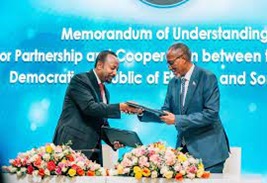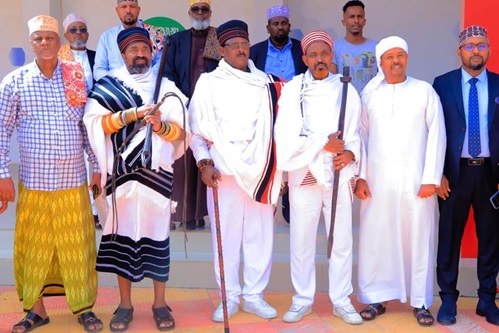By Professor Ezekiel Gebissa
We live in an era known as a ‘post-truth’ world, where ‘alternative facts’ replace actual facts, and intuitions carry more weight than evidence. It is in this space that Ethiopia’s Prime Minister, Abiy Ahmed, keeps publicly, repeatedly, and shamelessly telling verifiable lies with impunity. He tells Big Lies not so much to deny the truth but to invite people into an alternative reality in which he can achieve his party’s ideological supremacy by compelling them to believe such vacuous concepts as unity (መደመር) and prosperity (ብልፅግና).

There is a deeper point about Abiy’s inexplicable propensity to tell Big Lies. He is keenly aware that politics could be transformed by big lies told by those in positions of authority. This has been evident for a while but has so far been relatively confined to the domestic sphere.
The Big Lie
According to Yale historian Timothy Snyder,
the concept of the Big Lie originates with Adolf Hitler. In Mein Kampf, he offers PR advice: ‘If you tell a lie on a certain scale, that if it is big enough, people won’t believe that your goal is to deceive them on that scale. So, they believe it; once they believe, they don’t want to disbelieve later on. The lie becomes a part of their lives, it becomes such an alternative reality that it begins to shape politics. At this point, you act as if falsehood is true, and then you move on to doing things as if the big lie is true.’
The Big Lie phenomenon is a reality of the post-truth world, which Snyder says is pre-fascist. When people believe patently untrue statements by a leader, they are opening themselves to someone who says, ‘I am the anointed one’ who can make all your difficulties go away. Under the Prosperity Party, an alternative reality has been created which many accept as actual. This reality was made evident this week with the Memorandum of Understanding for Partnership and Cooperation (MoU) signed with Somaliland.
With the MoU signed with the Somaliland president, the Prosperity Party president scaled up the practice of telling a big lie to the international stage. Conventionally, an MoU signifies a convergence of intents, suggesting an impending binding contract. It cannot be a binding treaty, but it was paraded as a monumental triumph of Abiy Ahmed’s sophisticated diplomacy. In fact, it was a series of Big Lies foisted on the Ethiopian people in one package. Below is a list of some of the big lies.
1. Ethiopia gained a sovereign port (ኢትዮጵያ የወደብ ባለቤት ሆነች)
Prosperity Party officials, including the prime minister, assert that Ethiopia gained a sovereign port, a claim echoed uncritically by the Ethiopian media. The Somaliland president, sitting next to the prime minister, stated unambiguously that he agreed to a land lease to Ethiopia for naval operations for fifty years in exchange for Ethiopia’s recognition of Somaliland’s statehood. He did not mention granting a port to Ethiopia. If the Ethiopians’ claim of acquiring a sovereign port is true, officials should publish the MoU that both leaders signed. That would be the standard practice to announce a genuine agreement. The inconsistency could easily be clarified by disclosing the MoU both leaders signed, but the Ethiopian government seems intent on maintaining intentional ambiguity, possibly for political gains.
The acquisition of a sovereign port is a weighty matter between two nations, necessitating a treaty ratified by both parliaments. An MoU cannot finalize the transfer of a sovereign port or a harbor for the construction of a new port. This requires a treaty ratified by the parliaments of both countries. Declaring that Ethiopia now has a sovereign port in the territory of another sovereign country without a ratified treaty is at best premature and at worst, a fraud. Somaliland does not have the requisite legal and political standing, and a president whose term has expired has no legitimacy to conclude an internationally binding treaty. Ethiopia can conclude such an agreement only with the Republic of Somalia or with its acquiescence.
Even if we assume that the agreement is a legally binding one, it does not mean Ethiopia now has a sovereign port unless the Ethiopian side intends to build a port on a harbor leased from Somaliland. It is difficult to fathom how a cash-strapped country that is in default on payments to its debtors could raise the billions of dollars needed to build a new port. The whole thing is a charade, a big lie.
Overall, the ostentatious paraphernalia surrounding the signing of an MoU betrays the fact that the Prosperity Party is engaged in its usual public relations drama designed to deceive the public into believing that something significant was done for the country.
2. Ethiopia gained commercial maritime access to the sea (ኢትዮጵያ የቀይ ባህር በር አገኘች)
Prosperity Party officials assert that the MoU gives Ethiopia commercial maritime access to the sea. The prime minister goes even further, claiming the MoU fulfills his promise to recover Ethiopia’s lost ports and heals the resultant broken national spirit. The assertion is patently false. In his eagerness to create an alternative reality and claim that he has fulfilled his messianic mission to right all the perceived wrongs the Tigray People’s Liberation Front (TPLF) had committed, he seems to have overlooked basic geography, as the Bab-el Mandab separates the Red Sea from the Gulf of Aden.
The fact is that Ethiopia has never lost “access to the sea” in its history. Ethiopia has multiple ports of access to the sea, including Djibouti, Berbera, Mogadishu, Mombasa, and Port Sudan. Access to the Port of Berbera, which Prosperity Party officials are now presenting as a new deal, is disingenuous since Ethiopia has utilized it for nearly a decade and invested millions in connecting it to the Ethiopian hinterland.
3. Ethiopia acquired access to a naval base
This is the only valid aspect of the MoU, though it hasn’t been emphasized as a notable achievement. It was shrouded with sensationalized but undifferentiated claims of achieving a ‘sovereign port’ and ‘access to the sea.’ Every nation, including Ethiopia, possesses the right to establish a military base through agreements to position its naval forces globally – a right that is not contested.
Ethiopia has the right to boast that it needs a navy to protect its maritime interests. The problem is that the creation of naval power in the Red Sea region does not generate the public relations spectacle that Ethiopia’s return to being a sea power does. The purpose of the MoU was not the substance but the showmanship.
Big step into the unknown
The significant issue arising from the MoU is the news that Ethiopia will recognize Somaliland as an independent state. Ethiopia’s state minister of foreign affairs affirmed this week that Ethiopia welcomes the Somaliland president’s tweeted statement that “Ethiopia has agreed to grant recognition to Somaliland as an independent state.” The government’s latest position is that the MoU provides “for the Ethiopian government to make an in-depth assessment towards taking a position regarding the efforts of Somaliland to gain recognition.” Ethiopia’s longstanding policy position has been to deal with Somaliland with the consent of the Republic of Somalia, adhering to the bedrock principles of international relations pertaining to the sovereignty and territorial integrity of countries.
If the Prosperity Party government deviates from this stance and recognizes Somaliland as a sovereign state, Ethiopia will be opening the proverbial “Pandora’s Box,” weakening its own legal position of opposing claims of self-determination in its own territory. For instance, if Somalia recognizes “Western Somalia” (one of the historical designations for an independent state in the current Somali region), Kenya recognizes Oromia, or Eritrea extends recognition to Tigray, Ethiopia will not be able to invoke a legal principle it violated impudently.
And what would Ethiopia get in return? The one apparent gain is a naval base through a fifty-year lease. Is a naval base for Ethiopia’s untested navy worth the diplomatic fallout that turns Ethiopia into a pariah state surrounded by adversaries? Does the pursuit of a naval base justify subjecting Ethiopian Airlines to scrutiny by an external entity or to the vagaries of possible subversive activities sponsored by neighboring states? The Big Lie surrounding the MoU raises significant questions about the government’s ability to make strategic national decisions.
A perspective emerges that the MoU was a public relations stunt deployed to rally Ethiopians behind the regime for what appears to be a nationalist cause. It seems to be a ploy to divert attention away from the internal instability that is threatening the state’s integrity. At worst, it is the Ethiopian government serving the interests of an absolutist Gulf monarchy that believes money can buy anything. Doubts linger about the MoU and potential future agreements aligning with international law. For now, the MoU has succeeded in confusing the Ethiopian public into rallying behind a regime that has pinned its fate on perpetuating a Big Lie.
A Dangerous Gambit

There is something egregiously sinister behind the Prosperity Party leader’s stunt. Aware of what he was planning to unfurl with Somaliland, Abiy Ahmed corralled some Oromo Abba Gadaas ostensibly to promote traditional institutional solidarity with their Somaliland counterparts. While Abba Gadaas may have believed they were involved in a noble cause, they were unwittingly engaged in Abiy’s double-think, living in one lie, and preparing themselves for the next one, all the while imagining that somehow some greater good is being served. Somehow, they became instruments for Abiy’s maneuver aimed at creating an alternative reality in which he would exploit the historic Oromo-Somali brotherhood.
Professor Ezekiel Gebissa
——–
Ezekiel Gebissa is a professor of History and African study at Kettering University in Flint, Michigan. He can be reached at: egebissa@kettering.edu
__________
Related articles:
The historical search for a sea outlet and leadership legacy By Faisal A Roble

Leave a Reply